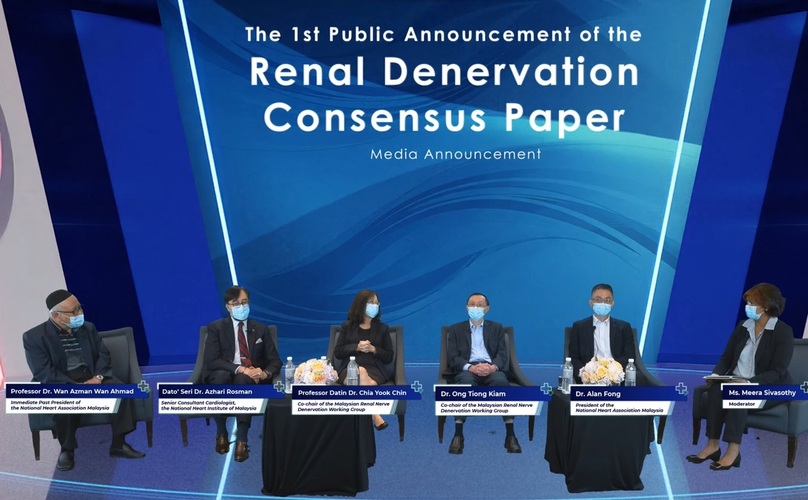
The Malaysian Renal Nerve Denervation Working Group (MyRDN) previewed its consensus paper on renal denervation publicly for the first time at a media forum hosted by Medtronic on Jan 10, 2022.
The paper provides recommendations and guidelines for healthcare professionals with regards to the use of this procedure in the treatment of people with hypertension.
The working group is a collaboration between the Malaysia Society of Hypertension and the National Heart Association of Malaysia.
The forum aimed to share their findings and knowledge on the procedure which has been studied and verified by the members of MyRDN.
The panel of distinguished medical experts comprised MyRDN co-chair and Malaysia Society of Hypertension immediate past president Professor Datin Dr Chia Yook Chin, MyRDN co-chair and council member of the National Heart Association of Malaysia Dr. Ong Tiong Kiam, National Heart Institute senior consultant cardiologist Dato’ Seri Dr. Azhari Rosman, National Heart Association Malaysia current president Dr. Alan Fong Yean Yip and National Heart Association immediate past president Professor Dr. Wan Azman Wan Ahmad
Dr Chia said hypertension is a serious problem in the country with three in 10 Malaysians having high blood pressure, but only half of them being aware that they have the ‘silent’ condition.
“On top of that, while 90% of those who are aware they have hypertension are on medication, only half have their blood pressure under proper control.
“This means that around 1.4 million Malaysians have uncontrolled high blood pressure – whether it’s because they are unaware of their condition or are not on optimal therapy – exposing them to complications like heart attacks, stroke and other heart diseases,” she said.
The senior consultant family physician added: “Renal denervation may prove to be of help in treating certain types of hypertensive patients, for example, those who have resistant hypertension, are consistently unable to adhere to their medication despite counselling and advice, or are on multiple medications for various co-morbid diseases.”
Renal denervation is a minimally-invasive procedure where radiofrequency waves are targeted at the renal (kidney) sympathetic nerves in order to reduce their activity, which contributes to hypertension. It is carried out under local anaesthesia and sedation, with patients usually allowed to go home the day after the procedure.
Dr Ong said renal denervation is a relatively simple and safe procedure but it is important that the patient’s expectations of the outcome be managed
“The drop in blood pressure will be gradual over a number of months and the patient will still need to continue taking their regular medications immediately after the procedure.
“In the long run, the procedure will enable most patients to better control their blood pressure, although it is unlikely they will be able to completely stop their antihypertensive drugs.
“The main benefit of the procedure is a decrease in the risk of organ damage and heart disease, like heart attacks and stroke, due to uncontrolled hypertension,” he said.
The consultant cardiologist and head of Sarawak General Hospital’s Department of Cardiology added: “Ideally, renal denervation should be offered early in the treatment of patients who fit the recommended criteria for the procedure. However, lifestyle modification and antihypertensive drugs are still the mainstays of treating high blood pressure. Renal denervation serves as an adjunct treatment for the sustained lowering of blood pressure in patients who met the criteria for the procedure.”







